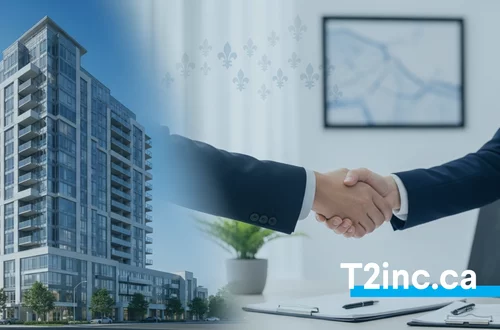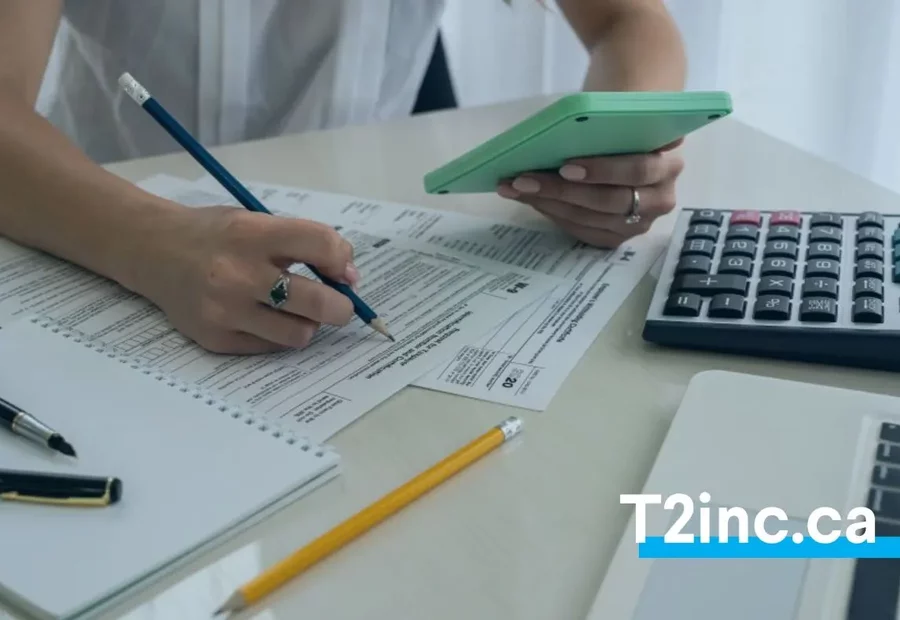CO-17.SP Form: Essential Tax Filing Requirement for syndicates of co-owners in Quebec

Do you manage a condominium syndicate in Quebec? Wondering whether you must submit the CO-17.SP return each year? In most cases, the answer is YES.
Under Quebec tax law, a condominium syndicate is recognized as a legal entity and a non-profit organization (NPO). While usually exempt from income tax, it must still file an annual information return with Revenu Québec. This return confirms its non-profit status, keeps its Registraire des entreprises du Québec (REQ) registration current, and ensures ongoing compliance.
In this guide, you’ll learn who must complete the CO-17.SP, when it’s due, what details to include, and how mandatory electronic submission now applies to all co-ownership syndicates across Quebec.
What Is the CO-17.SP Form?
The Revenu Québec Form CO-17.SP is officially titled the Information and Income Tax Return for Non-Profit Corporations.
It serves as the provincial counterpart to the federal T2 and T1044 returns, applying to non-profit organizations that manage shared property for the benefit of co-owners without profit.
By completing this return, your syndicate:
- Reports its provincial financial and administrative information;
- Pays its annual registration fees to the REQ;
- Keeps its official records up to date and in compliance.
You can access the official CO-17.SP form on Revenu Québec’s website and consult the CO-17.SP.G income tax guide for detailed filing instructions.
CO-17.SP vs. CO-17: Understanding the Difference
Both returns are issued by Revenu Québec, but they apply to different entities:
- CO-17.SP form: for non-profit organizations (NPOs), including most condominium syndicates; used to report information, pay REQ fees, and maintain compliance.
- CO-17 form: for taxable corporations or when a corporation claims a provincial tax credit or has taxable income to report.
If you’re unsure which return applies, consult the CO-17.SP.G guide or a CPA familiar with Quebec non-profit filings.
Why Condominium Syndicates Must File an Annual Information Return
Even if it doesn’t earn taxable income, a registered condominium syndicate remains a legal entity that must comply with both provincial and federal requirements.
Filling the CO-17 form for the syndicate of co-ownership Revenu Québec to confirm that the syndicate continues to operate as a non-profit entity dedicated to managing and maintaining co-owned property.
A registered syndicate (NEQ starting with “11”) must therefore:
- Submit the CO-17.SP;
- Submit a T2 Corporate Income Tax Return with the CRA;
- Attach schedules 100, 125 and 141;
- Provide the T1044 Non-Profit Information Return if the CRA thresholds apply
(assets > $200,000 during the fiscal year or investment/property income > $10,000 or a previous T1044 obligation).
According to the CRA, all resident corporations must produce a T2 return each year, even if no GST, QST or income tax is payable. You can consult our detailed T2 Form Guide for Canadian Corporations for more information.

Registration and Identification of the Syndicate
Before completing the CO-17.SP, the condo syndicate must be registered with the Registraire des entreprises du Québec (REQ). If it doesn’t appear in the database, contact the notary who prepared the declaration of co-ownership or complete the registration online.
Once registered, make sure to:
- Obtain your Quebec Enterprise Number (NEQ);
- Register with both Revenu Québec and the CRA to obtain identification numbers;
- Keep your documents carefully for future tax obligations.
Proper registration ensures your return can be processed within the prescribed time frame and associated with the correct legal entity.
Who Signs and What Information Must Be Included
The authorized representative, usually the president or treasurer, must sign the return. You may also authorize a CPA accountant or tax specialist to complete and transmit it electronically on behalf of the syndicate.
Attach the following documents:
- Financial statements for the fiscal year;
- An updated list of directors and officers;
- The federal forms (T2, T1044) if applicable.
The T2 and T1044 forms are federal filings and must be submitted separately to the CRA, not attached to the CO-17.SP. Keep proof of transmission and all supporting documentation (minutes, budgets, interest statements) in case of a future audit.
Annual Updating Declaration and the CO-17.SP
Each year, organizations must file an Annual Updating Declaration with the REQ. If the CO-17.SP is filed within six months following the fiscal year-end and “YES” is checked in box 39, this update is automatically considered completed, though the REQ annual fee still applies.
This integration simplifies compliance by combining your tax filing and registry update into a single step.
Other Forms That May Be Required
Some syndicates must also complete section 3 of the CO-17.SP or the federal T1044 Non-Profit Organization Information Return if CRA thresholds are exceeded:
- Investment or property income (interest, rents, royalties, dividends) over $10,000;
- Total assets exceeding $200,000 at the end of the previous fiscal year;
- Or a previous obligation to send the T1044.
These rules apply to non-profit organizations, including most co-ownership syndicates. In Quebec, some tax-exempt entities may also need to file Form TP-997.1 – Information Return for Tax-Exempt Entities, depending on their activities and assessment category. If you are unsure, seek advice from a CPA accountant or tax professional familiar with non-profit taxation in the province.
Quick Comparison of Required Returns
| Form | Authority | Entity Type | Filing Deadline |
|---|---|---|---|
| CO-17.SP | Revenu Québec | Non-profit / Condominium syndicate | 6 months after fiscal year-end |
| T2 | Canada Revenue Agency | Corporation (including NPOs) | 6 months after fiscal year-end |
| T1044 | Canada Revenue Agency | NPOs exceeding federal thresholds | 6 months after fiscal year-end |
Mandatory Electronic Filing for CO-17.SP and T2 Returns
For fiscal years starting in 2024, electronic filing has become mandatory for most corporations at both levels of government. In Quebec, all corporate returns (CO-17, CO-17.SP) must be filed online, except for registered charities. At the federal level, the T2 must also be submitted electronically, except for certain tax-exempt entities under subsection 149 of the Income Tax Act, including many NPOs.
In practice:
- Prepare your financial statements and key information (NEQ, directors, contact details);
- Review all required sections (including box 39 if REQ updates apply);
- Submit electronically and keep proof of transmission.
Failure to comply with these electronic filing requirements may lead to processing delays and, in some cases, administrative penalties.
At T2inc.ca, we specialize in corporate tax return preparation and can assist you through our affordable online solution designed for small businesses and condo syndicates.
Filing Deadline for the CO-17.SP Form and Late-Filing Penalties
The CO-17.SP return must be submitted within six months following the end of the fiscal year.
For example, a fiscal year ending December 31 must be filed by June 30 of the following year. Late filing can result in:
- A $25 per day penalty (minimum $100, maximum $2,500);
- Reminder notices from Revenu Québec;
- Possible delays in REQ updates or future assessments.
Late submissions may also affect your registry record and delay future assessments. To avoid penalties, plan your filing schedule early and keep a checklist of required documents.
Consequences of Missing or Incomplete Filing
Failing to file the CO-17.SP can create both administrative and legal complications:
- Delay in updating your REQ record;
- Obstacles during property transactions or resale of condo units;
- Loss of credibility and non-compliance status with tax authorities.
Board members are responsible for ensuring that the syndicate’s information return is filed within the prescribed deadline.
Example: Small vs. Large Co-Owner Syndicate
Let’s look at two cases:
- Small building (12 units): contingency fund $60,000, annual interest income $3,000.
- Must file CO-17.SP and T2, but not T1044 (thresholds not met).
- Large complex (100 units): contingency fund $800,000, annual interest income $15,000.
- Must file CO-17.SP, T2, and T1044, since federal thresholds are exceeded.
Each situation must be assessed individually based on assets, investment income, and organizational structure.
CO-17.SP Guide: How T2inc.ca Helps Condo Syndicates with Their Annual Tax Obligations
The CO-17.SP form is more than an administrative step. It validates your non-profit status, keeps your registry accurate, and ensures transparency with Revenu Québec.
With electronic filing now mandatory, proper preparation is more important than ever. To avoid penalties and meet your deadlines, centralize your documents, submit your forms online, and keep your records. If you prefer to delegate this task with confidence, our team can help you with your condominium association's tax obligations.
At T2inc.ca, our team of corporate tax accountants helps Quebec syndicates of co-owners manage their CO-17 Tax Returns. We handle all e-filing procedures, ensure accuracy, and help you stay compliant at both levels of government.
Contact us today to request a quote or learn how we can support your declaration of co-ownership.
- What Is the CO-17.SP Form?
- CO-17.SP vs. CO-17: Understanding the Difference
- Why Condominium Syndicates Must File an Annual Information Return
- Registration and Identification of the Syndicate
- Who Signs and What Information Must Be Included
- Annual Updating Declaration and the CO-17.SP
- Mandatory Electronic Filing for CO-17.SP and T2 Returns
- Filing Deadline for the CO-17.SP Form and Late-Filing Penalties
- Consequences of Missing or Incomplete Filing
- Example: Small vs. Large Co-Owner Syndicate
- CO-17.SP Guide: How T2inc.ca Helps Condo Syndicates with Their Annual Tax Obligations
Contact our experts
Have a question? Need help? Fill out our online form to get help from our experts.
Contact usNeed more help?
Contact us by filling out our form
Are you interested in our services, but would like more information before taking the plunge? Contact us today and one of our tax accountants will be in touch to help you.
At T2inc.ca, we're committed to helping business owners manage their company's tax affairs so they can grow their business.




